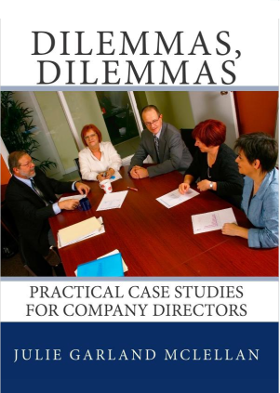Dear reader,
Welcome to the June 2018 edition of The Director’s Dilemma.
Please help me continue to increase the positive impact of this newsletter by forwarding a copy to a board colleague (or aspiring director) with a suggestion that they may wish to subscribe.
To read this email in a browser, go to www.mclellan.com.au/newsletter.html and click on 'read the latest issue'.
This month our case study protagonist risks being swept into a disaster that is not of her making. I hope you enjoy thinking about the governance and strategic implications of the latest dilemma:
 Adam chairs a not for profit board and its nominations committee. His fellow directors are all Anglo-Saxon, tertiary educated men in their seventies, with successful business careers. The company has performed very well and grown to serve the needs of a more diverse group of beneficiaries than he imagined when he founded it over forty years ago. The business enjoys a comfortable surplus and sound reputation.
Adam chairs a not for profit board and its nominations committee. His fellow directors are all Anglo-Saxon, tertiary educated men in their seventies, with successful business careers. The company has performed very well and grown to serve the needs of a more diverse group of beneficiaries than he imagined when he founded it over forty years ago. The business enjoys a comfortable surplus and sound reputation.
Recently, however, Adam has started to worry about diversity, or more correctly, a lack of diversity, on his board.
When Adam raised this concern half of the board reacted very negatively saying they had been appointed on merit and that any lowering of standards would harm the business. The other half reacted very positively and, indeed, a few claimed that they also had been concerned and wanted to see some change.
Now Adam is in a bind. His board has reached agreement that they want to retain the criteria of tertiary qualifications and a proven track record of good commercial judgement. They have supported the idea of appointing two 'younger' women if Adam can find some who are willing to serve on an unpaid board and who also meet the criteria. Adam is sure there are plenty of such women but doesn't know how to find them. There are certainly none in his social circle and he is hesitant to approach a professional search firm because his board has never used one in the past. He is not sure if it is okay to advertise and specify gender or age preferences. He also wants a cultural fit strong enough to ensure that the new directors form a team with the existing board including the ones who were against 'change for change's sake'.
What can Adam do?

 Adam, as chair of the nominations committee, could undertake a review prior to recruiting new directors.
Adam, as chair of the nominations committee, could undertake a review prior to recruiting new directors. Adam has done well to successfully guide the company he founded for over forty years. Now it is time for the company to renew its board and governance so as to thrive in the future. Adam can get professional help from a qualified board consultant who will be able to advise on the skills and experiences that would most benefit the board given the future strategy and current business challenges.
Adam has done well to successfully guide the company he founded for over forty years. Now it is time for the company to renew its board and governance so as to thrive in the future. Adam can get professional help from a qualified board consultant who will be able to advise on the skills and experiences that would most benefit the board given the future strategy and current business challenges. Adam's focus on 'younger' women may be imprudent and will not be helpful when arguing that merit-based selection was used. Candidates should be assessed on their qualifications, skills and (commercial) experiences as well as their capacity to fit in culturally.
Adam's focus on 'younger' women may be imprudent and will not be helpful when arguing that merit-based selection was used. Candidates should be assessed on their qualifications, skills and (commercial) experiences as well as their capacity to fit in culturally.


